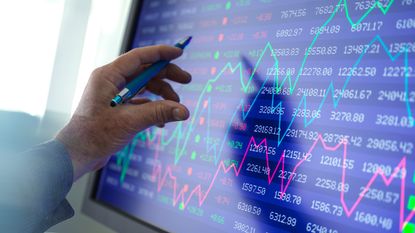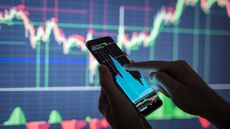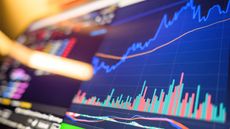Stock Market Today: Markets Waver on Debt Default Jitters
The looming debt ceiling crisis, disappointing results from Home Depot and a mixed retail sales report weighed on stocks Tuesday.


Stocks wavered Tuesday as Washington resumed negotiations over raising the debt ceiling in order to avoid a historic default on U.S government borrowings.
A disappointing quarterly earnings report from Dow stock Home Depot (HD), a mixed reading on retail sales and the disclosure of some big changes in Berkshire Hathaway's (BRK.B) portfolio also impacted equities.
The stock market has been mostly sanguine about the debt-ceiling crisis, but in the words of Treasury Secretary Janet Yellen, "time is running out" to avert an economic catastrophe that would reverberate around the globe. As of Tuesday morning, House Speaker Kevin McCarthy said "no progress" had been made ahead of today's 3 pm Eastern meeting.

Sign up for Kiplinger’s Free E-Newsletters
Profit and prosper with the best of expert advice on investing, taxes, retirement, personal finance and more - straight to your e-mail.
Profit and prosper with the best of expert advice - straight to your e-mail.
On the earnings front, shares in Home Depot slid after the nation's largest home improvement retail chain posted a decline in first quarter sales and lowered its full-year guidance.
Home Depot lands in the middle of the pack when it comes to analysts' all 30 Dow stocks ranked, and it is likely to fall further after Tuesday. CFRA Research analyst Ana Garcia cut her recommendation on shares to Hold from Buy.
"Our positive long-term view on HD is tempered by near-term headwinds," Garcia wrote in a note to clients. "We are cautious in betting on personal consumption expenditures growth favoring home improvement retailers, with the Do-It-Yourself (DIY) and Professional segments both down year-over-year, and DIY outperforming Pro."
A mixed report on consumer spending also served as a stumbling block for equities on Tuesday. U.S. retail sales rose 0.4% in April, the Commerce Department said before the opening bell. Although that was better than March's revised decline of 0.7%, retail sales still missed economists' average forecast for 0.8% growth. Although consumer spending picked up last month vs March, retail sales have declined in four of the past six months.
"The consumer is still spending and absorbing higher prices, though big ticket items are weak, having been pulled forward during the pandemic," says Louis Navellier, founder and chief investment officer of Navellier & Associates. "Credit card balances are high despite record interest rates charged, and the wealth effect of higher home prices and 401(k) results is waning."
At the closing bell, the blue-chip Dow Jones Industrial Average was off 1.0% to finish at 33,012, while the broader S&P 500 slid 0.6% to 4,109. The tech-heavy Nasdaq Composite dropped 0.2% to end at 12,343.
Warren Buffett sells stocks in Q1

Also not helping markets on Tuesday was the fact that Warren Buffett kicked two more bank stocks out of the Berkshire Hathaway equity portfolio, according to regulatory filings. Berkshire, of which Buffett serves as chairman and CEO, exited longtime positions in both Bank of New York Mellon (BNY) and U.S. Bancorp (USB) during the first quarter.
Although Berkshire Hathaway did initiate a stake in Capital One Financial (COF) in Q1, Buffett has mostly been getting out of bank stocks since the early days of the pandemic. At Berkshire Hathaway's annual shareholder meeting in early May, Buffett cited an overly complicated banking system, mismanagement and bad incentives for his loss of interest in the sector.
"The American public doesn’t understand their banking system — and some people in Congress don’t understand it anymore than I understand it," Buffett told the Berkshire faithful.
As for equities in general, Capital One was the only name Buffett added to Berkshire Hathaway's roster of investments in the first quarter. On the sell side of the ledger, Buffett exited or cut stakes in a total of 13 stocks during the first three months of 2023.
In total, Berkshire Hathaway was a net seller of equities to the tune of $10.4 billion in Q1. The holding company also spent $4.4 billion buying back its own stock.
Have a look at the stocks Warren Buffett is buying and selling these days. Note that Apple (AAPL), which Buffett describes as his "third business," now comprises 46% of the portfolio, up from 38.9% at the end of Q4. That's partly attributable to a change in the way Berkshire Hathaway reports its stock holdings. But it's also because Apple stock has generated astonishing outperformance in 2023.
Indeed, Apple stock is soaring, up by a third for the year-to-date to cement its place as one of the best stocks of the past 30 years. A mere $1,000 invested in Apple stock 20 years ago would have generated stupefying returns too.

Dan Burrows is Kiplinger's senior investing writer, having joined the august publication full time in 2016.
A long-time financial journalist, Dan is a veteran of SmartMoney, MarketWatch, CBS MoneyWatch, InvestorPlace and DailyFinance. He has written for The Wall Street Journal, Bloomberg, Consumer Reports, Senior Executive and Boston magazine, and his stories have appeared in the New York Daily News, the San Jose Mercury News and Investor's Business Daily, among other publications. As a senior writer at AOL's DailyFinance, Dan reported market news from the floor of the New York Stock Exchange and hosted a weekly video segment on equities.
In his current role at Kiplinger, Dan writes about equities, fixed income, currencies, commodities, funds, macroeconomics, demographics, real estate, cost of living indexes and more.
-
-
 What’s in DeSantis’ $1.3 Billion Florida Tax Relief Bill?
What’s in DeSantis’ $1.3 Billion Florida Tax Relief Bill?DeSantis' $1.3 billion tax relief bill extends sales tax holidays and makes other tax cuts. Here's what you can buy tax-free — and when.
By Katelyn Washington • Published
-
 Letter from the Senior Digital Editor: Celebrating Pride
Letter from the Senior Digital Editor: Celebrating PrideKiplinger senior digital editor Alexandra Svokos writes at the start of Pride Month.
By Alexandra Svokos • Published
-
 Stock Market Today: Stocks Soar After Jobs Data, Debt Ceiling Deal
Stock Market Today: Stocks Soar After Jobs Data, Debt Ceiling DealThe major benchmarks rallied hard into the weekend after a mixed May jobs report and end to debt ceiling drama.
By Karee Venema • Published
-
 Stock Market Today: Stocks Rally on Debt Ceiling News, Manufacturing Data
Stock Market Today: Stocks Rally on Debt Ceiling News, Manufacturing DataA slow start turned into a strong finish for stocks thanks to encouraging debt ceiling updates and the latest economic data.
By Karee Venema • Published
-
 Is Chevron Stock Set for a Rebound?
Is Chevron Stock Set for a Rebound?Chevron stock received its second analyst upgrade in as many days, boosting hopes for a recovery in the lagging energy major.
By Dan Burrows • Published
-
 Stock Market Today: Stocks Close Lower Ahead of Key Debt Ceiling Vote
Stock Market Today: Stocks Close Lower Ahead of Key Debt Ceiling VoteThe major benchmarks spent most of Wednesday in the red as the House prepares to vote on the debt ceiling deal this evening.
By Karee Venema • Published
-
 Stock Market Today: Stocks Give Back Big Debt Ceiling Deal Gains
Stock Market Today: Stocks Give Back Big Debt Ceiling Deal GainsThe major benchmarks opened solidly higher Tuesday after lawmakers announced a debt ceiling deal, but optimism faded into the close.
By Karee Venema • Published
-
 9 Momentum Stocks to Buy Now
9 Momentum Stocks to Buy NowWant to ride the hot hand of the market? Consider these nine momentum stocks that are climbing the charts this year.
By Jeff Reeves • Published
-
 Stock Market Today: Stocks Jump on Debt Ceiling Progress
Stock Market Today: Stocks Jump on Debt Ceiling ProgressThe major benchmarks rallied into the long weekend after lawmakers said they're making strides in debt ceiling negotiations.
By Karee Venema • Published
-
 Stock Market Today: Stocks Rise After AI Outlook Sparks Explosive Nvidia Rally
Stock Market Today: Stocks Rise After AI Outlook Sparks Explosive Nvidia RallyThe Nasdaq and S&P 500 made impressive advances today after chipmaker Nvidia forecast record quarterly revenue on AI growth.
By Karee Venema • Published









